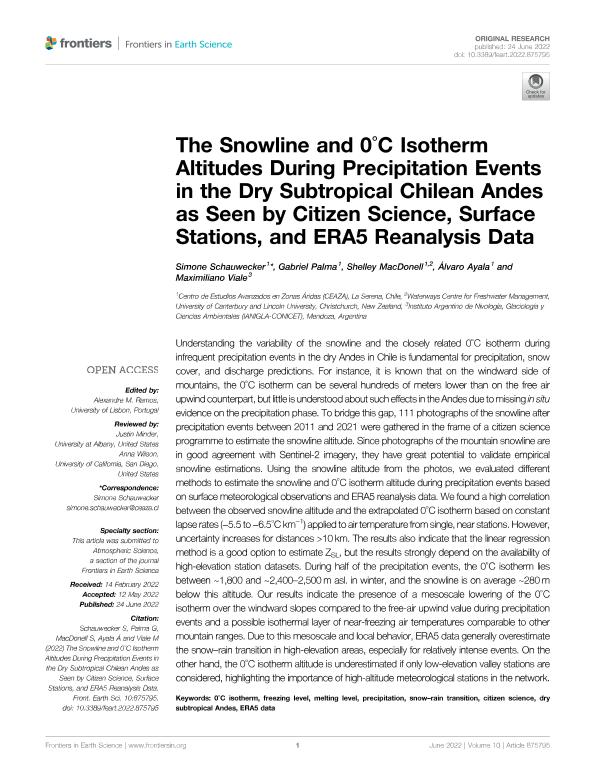Mostrar el registro sencillo del ítem
dc.contributor.author
Schauwecker, Simone
dc.contributor.author
Palma, Gabriel
dc.contributor.author
MacDonell, Shelley
dc.contributor.author
Ayala, Álvaro
dc.contributor.author
Viale, Maximiliano

dc.date.available
2023-07-12T13:08:03Z
dc.date.issued
2022-06
dc.identifier.citation
Schauwecker, Simone; Palma, Gabriel; MacDonell, Shelley; Ayala, Álvaro; Viale, Maximiliano; The Snowline and 0°C Isotherm Altitudes During Precipitation Events in the Dry Subtropical Chilean Andes as Seen by Citizen Science, Surface Stations, and ERA5 Reanalysis Data; Frontiers Media; Frontiers in Earth Science; 10; 6-2022; 1-19
dc.identifier.issn
2296-6463
dc.identifier.uri
http://hdl.handle.net/11336/203411
dc.description.abstract
Understanding the variability of the snowline and the closely related 0°C isotherm during infrequent precipitation events in the dry Andes in Chile is fundamental for precipitation, snow cover, and discharge predictions. For instance, it is known that on the windward side of mountains, the 0°C isotherm can be several hundreds of meters lower than on the free air upwind counterpart, but little is understood about such effects in the Andes due to missing in situ evidence on the precipitation phase. To bridge this gap, 111 photographs of the snowline after precipitation events between 2011 and 2021 were gathered in the frame of a citizen science programme to estimate the snowline altitude. Since photographs of the mountain snowline are in good agreement with Sentinel-2 imagery, they have great potential to validate empirical snowline estimations. Using the snowline altitude from the photos, we evaluated different methods to estimate the snowline and 0°C isotherm altitude during precipitation events based on surface meteorological observations and ERA5 reanalysis data. We found a high correlation between the observed snowline altitude and the extrapolated 0°C isotherm based on constant lapse rates (−5.5 to −6.5°C km−1) applied to air temperature from single, near stations. However, uncertainty increases for distances >10 km. The results also indicate that the linear regression method is a good option to estimate ZSL, but the results strongly depend on the availability of high-elevation station datasets. During half of the precipitation events, the 0°C isotherm lies between ∼1,800 and ∼2,400–2,500 m asl. in winter, and the snowline is on average ∼280 m below this altitude. Our results indicate the presence of a mesoscale lowering of the 0°C isotherm over the windward slopes compared to the free-air upwind value during precipitation events and a possible isothermal layer of near-freezing air temperatures comparable to other mountain ranges. Due to this mesoscale and local behavior, ERA5 data generally overestimate the snow–rain transition in high-elevation areas, especially for relatively intense events. On the other hand, the 0°C isotherm altitude is underestimated if only low-elevation valley stations are considered, highlighting the importance of high-altitude meteorological stations in the network.
dc.format
application/pdf
dc.language.iso
eng
dc.publisher
Frontiers Media

dc.rights
info:eu-repo/semantics/openAccess
dc.rights.uri
https://creativecommons.org/licenses/by/2.5/ar/
dc.subject
0°C ISOTHERM
dc.subject
CITIZEN SCIENCE
dc.subject
DRY SUBTROPICAL ANDES
dc.subject
ERA5 DATA
dc.subject
FREEZING LEVEL
dc.subject
MELTING LEVEL
dc.subject
PRECIPITATION
dc.subject
SNOW–RAIN TRANSITION
dc.subject.classification
Oceanografía, Hidrología, Recursos Hídricos

dc.subject.classification
Ciencias de la Tierra y relacionadas con el Medio Ambiente

dc.subject.classification
CIENCIAS NATURALES Y EXACTAS

dc.title
The Snowline and 0°C Isotherm Altitudes During Precipitation Events in the Dry Subtropical Chilean Andes as Seen by Citizen Science, Surface Stations, and ERA5 Reanalysis Data
dc.type
info:eu-repo/semantics/article
dc.type
info:ar-repo/semantics/artículo
dc.type
info:eu-repo/semantics/publishedVersion
dc.date.updated
2023-07-05T15:26:44Z
dc.journal.volume
10
dc.journal.pagination
1-19
dc.journal.pais
Suiza

dc.description.fil
Fil: Schauwecker, Simone. Centro de Estudios Avanzados En Zonas Áridas; Chile
dc.description.fil
Fil: Palma, Gabriel. Centro de Estudios Avanzados En Zonas Áridas; Chile
dc.description.fil
Fil: MacDonell, Shelley. University of Canterbury; Nueva Zelanda. Centro de Estudios Avanzados En Zonas Áridas; Chile
dc.description.fil
Fil: Ayala, Álvaro. Centro de Estudios Avanzados En Zonas Áridas; Chile
dc.description.fil
Fil: Viale, Maximiliano. Consejo Nacional de Investigaciones Científicas y Técnicas. Centro Científico Tecnológico Conicet - Mendoza. Instituto Argentino de Nivología, Glaciología y Ciencias Ambientales. Provincia de Mendoza. Instituto Argentino de Nivología, Glaciología y Ciencias Ambientales. Universidad Nacional de Cuyo. Instituto Argentino de Nivología, Glaciología y Ciencias Ambientales; Argentina
dc.journal.title
Frontiers in Earth Science
dc.relation.alternativeid
info:eu-repo/semantics/altIdentifier/url/https://www.frontiersin.org/articles/10.3389/feart.2022.875795/full
dc.relation.alternativeid
info:eu-repo/semantics/altIdentifier/doi/http://dx.doi.org/10.3389/feart.2022.875795
Archivos asociados
